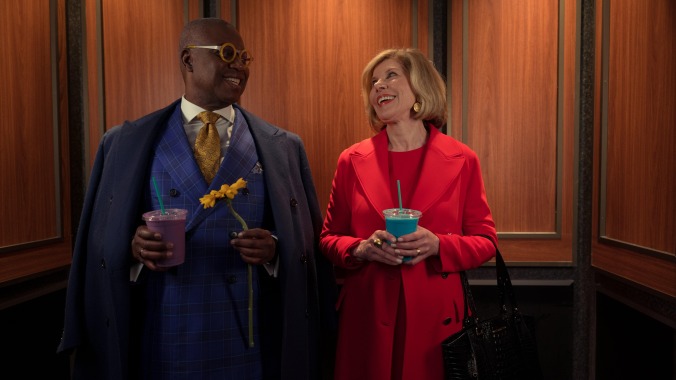The Good Fight's final season is a worthy, timely sendoff
The Paramount Plus series comes to a close, finding hope in all the absurdity

A warning for fans of The Good Fight: The sixth and final season feels different. The Paramount+ original returns after its stellar fifth season—which included COVID hallucinations and Hal Wackner’s copy-house court—with a more muted, realistic vibe. There are no Epstein-scale conspiracies or fictionalized political figures popping up in scenes, and even Jonathan Coulton’s beloved Schoolhouse Rock-style explainers are missing. It’s very much The Good Fight stripped down to its basic, surrealist trademarks, as the show wraps up with an examination of our present, more pessimistic cultural climate.
Part of season six’s muting comes from Diane (Christine Baranski), who takes more of a back seat this time around. After her white-feminist ideals were challenged throughout season five, which finished with her agreeing to step down as partner, the intrepid attorney returns from vacation to a new office on the associates’ floor. The regression of progress, both in her career and our world after the end of Roe v. Wade, has Diane feeling that she’s stuck in a loop of deja vu. So she turns to Dr. Lyle Bettencourt (John Slattery) and a somehow-legal prescription hallucinogen called PT108. While the chemistry between Baranski and Slattery is obvious, the extended time with High Diane is this subplot’s strong point, with callbacks to previous seasons where she took the edge off through micro-dosing and weed gummies.
Meanwhile, the struggle over control of the firm falls on Liz (Audra McDonald) and the new name partner, Ri’Chard Lane (Andre Braugher). Lane operates through ostentatiousness and prayer, shaking up the office from the moment he walks out of the elevator and commands the biggest office on the partners’ floor, gathering associates and moving artwork while Liz is out at court. The duo’s conflict continues the partner power struggles that have been a common go-to throughout both The Good Fight and its predecessor The Good Wife. And while it feels like a rehash at the start, luckily any hint of a rut melts away as Liz (and the audience) begins to see through the brash show Ri’Chard wears as armor.








































